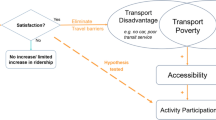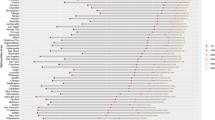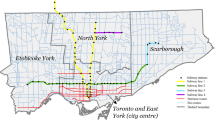Abstract
The urgent need to optimize operational efficiency, boost ridership, enlarge effective communication technologies, and improve customer convenience has led to the emergence of on-demand transit (ODT) services. ODT can be advantageous in several ways, including reliability, improving mobility, cost-effectiveness, and reducing the need for multi-transit services. This paper analyzed the trip patterns of on-demand services and the impacts on ridership by the difference-in-difference method. The pattern analyses showed that the origin–destination flow patterns are concentrated in large commercial and dense residential areas with significantly reduced travel times including the waiting times and in-vehicle times. Furthermore, the difference-in-difference model analyses yielded positive relations between the ridership and the on-demand transit services for the overall transit network while the effects vary with specific landuse zones. Results indicated the potential of on-demand transit services to benefit passengers and ridership recovery during the pandemic and post-pandemic.
Access this chapter
Tax calculation will be finalised at checkout
Purchases are for personal use only
Similar content being viewed by others
References
Alsaleh N, Farooq B (2021) Interpretable data-driven demand modelling for on-demand transit services. Transp Res Part A: Policy Pract 154:1–22
Archetti C, Speranza MG, Weyland D (2018) A simulation study of an on-demand transportation system. Int Trans Oper Res 25(4):1137–1161
Badia H, Argote-Cabanero J, Daganzo CF (2017) How network structure can boost and shape the demand for bus transit. Transp Res Part A: Policy Pract 103:83–94
Bürstlein J, López D, Farooq B (2021) Exploring first-mile on-demand transit solutions for North American suburbia: A case study of Markham, Canada. Transp Res Part A: Policy and Pract 153:261–283
Cuevas V, Estrada M, Salanova JM (2016) Management of on-demand transport services in urban contexts. Barcelona case study. Transp Res Procedia 13:155–165
Dablanc L, Morganti E, Arvidsson N, Woxenius J, Browne M, Saidi N (2017) The rise of on-demand ‘Instant deliveries’ in European cities. Paper Presented Supply Chain Forum: Int J 18(4):203–217
Daoud A, Balbo F, Gianessi P, Picard G (2021) A generic multi-agent model for resource allocation strategies in online on-demand transport with autonomous vehicles. In: Paper presented at the proceedings of the 20th international conference on autonomous agents and multiagent systems (AAMAS 2021), vol 3
Devaraj A, Srinivasan KK, Basheer S (2020) Awareness, consideration and usage frequency of on-demand transport services in the Indian context. Transp Dev Econ 6(2):1–19
Giuffrida N, Le Pira M, Inturri G, Ignaccolo M, Calabrò G, Cuius B, Pluchino A (2020) On-demand flexible transit in fast-growing cities: the case of Dubai. Sustainability 12(11):4455
Haglund N, Mladenović MN, Kujala R, Weckström C, Saramäki J (2019) Where did kutsuplus drive us? ex post evaluation of on-demand micro-transit pilot in the helsinki capital region. Res Transp Bus Manag 32:100390
Hazan J, Lang N, Wegscheider AK, Fassenot B (2019) On-demand transit can unlock urban mobility. Boston Consulting Group
Javanmard ME, Tang Y, Wang Z, Tontiwachwuthikul P (2023) Forecast energy demand, CO2 emissions and energy resource impacts for the transportation sector. Appl Energy 338:120830
Komanduri A, Wafa Z, Proussaloglou K, Jacobs S (2018) Assessing the impact of app-based ride share systems in an urban context: findings from Austin. Transp Res Rec 2672(7):34–46
Liu Y, QI J, Yang H, Tang Y (2022) The passenger's willingness to wait with sunk waiting time: an empirical study in ride-sourcing market. Available at SSRN 4285203
Navidi Z, Ronald N, Winter S (2018) Comparison between ad-hoc demand responsive and conventional transit: a simulation study. Public Transp 10(1):147–167
Ronald N, Yang J, Thompson RG (2016) Exploring co-modality using on-demand transport systems. Transp Res Procedia 12:203–212
Ruch C, Lu C, Sieber L, Frazzoli E (2019) Quantifying the benefits of ride sharing
Sanaullah I, Alsaleh N, Djavadian S, Farooq B (2021) Spatio-temporal analysis of on-demand transit: a case study of Belleville, Canada. Transp Res Part A: Policy Pract 145:284–301
Tang Y, Jiang Y, Yang H, Nielsen OA (2020) Modeling and optimizing a fare incentive strategy to manage queuing and crowding in mass transit systems. Transp Res Part B: Methodological 138:247–267
Vij A, Ryan S, Sampson S, Harris S (2020) Consumer preferences for on-demand transport in australia. Transp Res Part A: Policy Pract 132:823–839
Wang S, Correia GHA, Lin HX (2019) Exploring the performance of different on-demand transit services provided by a fleet of shared automated vehicles: an agent-based model. J Adv Transp
Weinreich DP, Reeves SM, Sakalker A, Hamidi S (2020) Transit in flex: examining service fragmentation of app-based, on-demand transit services in Texas. Transp Res Interdiscip Perspect 5:100060
Xi H, Tang Y, Waller ST, Shalaby A (2023) Modeling, equilibrium, and demand management for mobility and delivery services in Mobility‐as‐a‐Service ecosystems. Comput Aided Civ Infrastruct Eng 38(11):1403–1423
Yang H, Tang Y (2018) Managing rail transit peak-hour congestion with a fare-reward scheme. Transp Res Part B: Methodological 110:122–136
Zhang Y, Farber S, Young M (2020) The benefits of on-demand transit in Belleville: findings from A user survey. Retrieved from https://tspace.library.utoronto.ca/handle/1807/100570
Zhao X, Yan X, Van Hentenryck P (2019) Modeling heterogeneity in mode-switching behavior under a mobility-on-demand transit system: an interpretable machine learning approach. arXiv Preprint arXiv:1902.02904
Acknowledgements
The authors wish to express their thanks to editors and anonymous reviewers for their constructive comments, and the City of Regina, Transit & Fleet Department for data resources and support. This research was partially supported by Faculty of Engineering Research Opportunities Fund at the University of Regina and the Natural Sciences and Engineering Research Council of Canada (NSERC), [NSERC RGPIN-2022-05028 and DGECR-2022-00522].
Author information
Authors and Affiliations
Corresponding author
Editor information
Editors and Affiliations
Rights and permissions
Copyright information
© 2024 Canadian Society for Civil Engineering
About this paper
Cite this paper
Tang, Y., Abdullah, D., Adewuyi, A., Luhning, N., Bhalla, S. (2024). What Can We Learn from On-Demand Transit Services for Ridership? A Case Study at the City of Regina, Canada. In: Gupta, R., et al. Proceedings of the Canadian Society of Civil Engineering Annual Conference 2022. CSCE 2022. Lecture Notes in Civil Engineering, vol 359. Springer, Cham. https://doi.org/10.1007/978-3-031-34027-7_49
Download citation
DOI: https://doi.org/10.1007/978-3-031-34027-7_49
Published:
Publisher Name: Springer, Cham
Print ISBN: 978-3-031-34026-0
Online ISBN: 978-3-031-34027-7
eBook Packages: EngineeringEngineering (R0)




